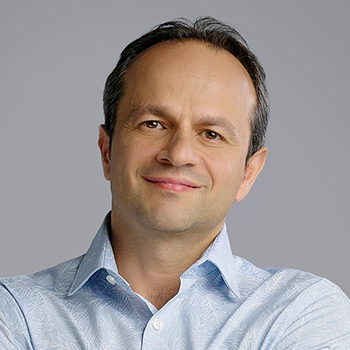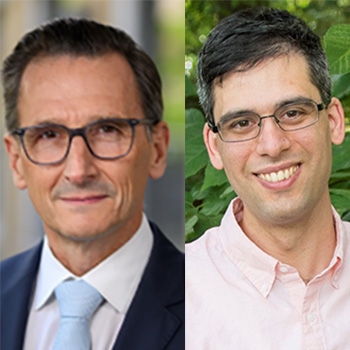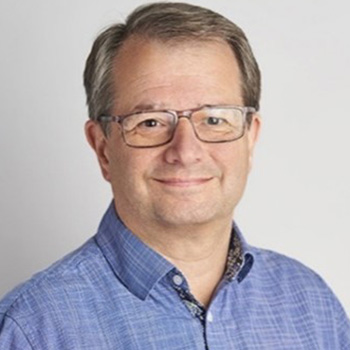Meet the Canadian research talent funded in the 2024 TRANSCAN-3 Joint Transnational Call on Combination Therapies
The CIHR Institute of Cancer Research (ICR) extends a warm congratulations to the three Canadian-supported consortia funded in the 2024 TRANSCAN-3 Joint Transnational Call (JTC): “Combination Therapies Against Cancer: New Opportunities for Translational Research”. Led by the European Union, TRANSCAN-3 is an international network with representation from 20 countries, including Canada, dedicated to funding high-priority and impactful cancer research through multinational collaborative team science.
As cancer continues to be a leading cause of death worldwide and is projected to increase significantly in the coming decades, new approaches to tackle the complexity of the disease are needed. The 2024 TRANSCAN-3 JTC aimed to tackle some of the challenges associated with cancer treatments, such as drug resistance and side effects, by supporting research on novel combination therapies.
CIHR, along with our valued partner the Cancer Research Society, co-funded researchers from Canada across three consortia―METRICs, PREDICT-BC and SARAH―to support novel approaches to combination therapies. Learn more about the Canadian research talent funded in the 2024 TRANSCAN-3 JTC and how international collaboration has been foundational to advancing their work:
METRICs
Metabolism/Metagenomics-based strategies for sensitization to Radio- and Immuno-therapy Combinations
While radiation and immunotherapy are both powerful tools, not all patients with bladder cancer benefit equally. The METRICs consortium aims to find the best radiation schedule combined with immunotherapy and test if the body’s gut bacteria and metabolism can influence treatment success.
Dr. Wassim Kassouf, a Professor at McGill University, is collaborating with scientists from Austria, Germany, Spain, France, Italy and Turkey to undertake this research. Comprised of diverse expertise in radiation oncology, immunology, and microbiome-metabolome interactions, this consortium aims to uncover immune mechanisms and identify gut microbes that could enhance treatment response and ultimately support the future development of personalized, multimodal cancer therapies.

“We hope our work will bring new hope to people facing muscle-invasive bladder cancer by personalizing treatment to be more effective and less toxic. By understanding how the immune system and gut microbiome influence therapy, we aim to turn today’s challenges into tomorrow’s cures. The international collaboration within TRANSCAN-3 has been vital—uniting complementary expertise and resources to accelerate discovery and translate science into benefits for patients.”
PREDICT-BC
Patient-derived models for the Research and Evaluation of Discovery and Innovation in Combination Therapies for Biliary Cancer
Biliary tract cancer (BTC) is a rare but aggressive disease with limited treatment options. Although new drugs have been developed to target specific genetic changes in BTC, their effectiveness is often short-lived or varies greatly between patients. PREDICT-BC―comprised of experts from Canada, Germany, Spain and Italy―aims to find new drug combinations that make current therapies more effective and longer lasting.
By building a large collection of BTC tumour models from patients, the team will leverage advanced techniques to move the needle towards more personalized and effective strategies for people living with BTC. Drs. Arndt Vogel and Gregory Schwartz from the Princess Margaret Cancer Centre at the University Health Network are advancing the consortium’s work by contributing their unique scientific expertise in genetic analyses and bioinformatics, respectively.

“Our project aims to improve treatment options for people with biliary tract cancer by identifying more effective drug combinations. The TRANSCAN-3 international collaboration accelerates progress by sharing unique patient models, expertise, and resources, enabling more robust and clinically relevant discoveries than would be possible within one country or a single institution.”
SARAH
Search for combinational therapy to target clonal haematopoiesis in solid malignancies
As we age, some blood stem cells can develop mutations―a phenomenon called clonal haematopoiesis of indeterminate potential (CHIP)―that can increase the risk and development of certain cancers, such as lung or pancreatic cancer. These mutations can create a long-lasting, harmful inflammatory environment in the body and also alter the immune system.
Scientists from Canada, Germany and Austria formed SARAH, a consortium focused on exploring how these mutations affect cancer growth and treatment response. Dr. Tarik Möröy, a Professor from the Université de Montréal and researcher at the University’s Institut de recherches cliniques de Montréal (IRCM), is contributing to the project, which ultimately aims to identify new drug combinations that can target both the cancer and the inflammation caused by these CHIP mutations. By doing so, Dr. Möröy and the team hope to improve treatment outcomes and personalize therapies for patients with cancer, especially those with CHIP mutations.

“I am confident that with this project, we will finally be able to influence and remodel the tumour microenvironment to improve clinical outcomes for patients with lung and pancreatic cancers. These two cancer types are among the most aggressive and the most difficult to treat. In the long term, this team of international experts aims to shift treatment paradigms in oncology by addressing the immune-infiltrated microenvironment, enhancing both the effectiveness and personalization of cancer therapy.”
More Reading
- Date modified: